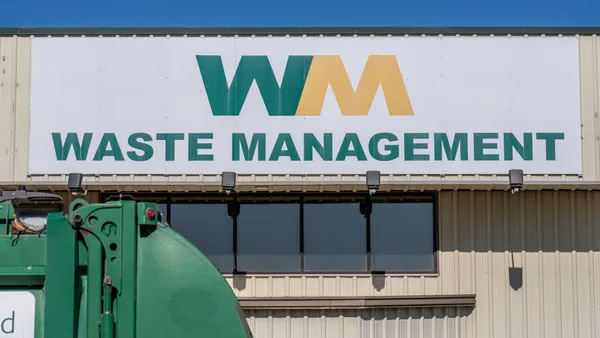Dive Brief:
- New York's Department of Sanitation (DSNY) confirmed 354 cases of COVID-19 among members of its workforce, as of Wednesday morning, including one death. Among that group, 40 people had recovered and were back to work in a city now considered the epicenter of the pandemic in the United States.
- Other large cities have reported no major outbreaks among their sanitation workers to date. Hans Van Dusen, solid waste contracts manager for Seattle Public Utilities, told Waste Dive no city transfer operations employees have tested positive – although some staff have been out due to symptoms or possible exposure – and he was not aware of cases among the city's contracted haulers. Boston's Public Works Department, which also contracts out residential collection, was not aware of any cases. The Phoenix Public Works Department, which handles its own residential collection, similarly has seen none, as is the case for Atlanta.
- New York is currently thought to be closer to its peak of COVID-19 cases, which would explain DSNY's rising count, but other cities of similar size or infection risk are also not reporting data. Kelly Cofrancisco, a spokesperson for the Philadelphia Streets Department, said the city is not confirming if and when any employees test positive for COVID-19. Los Angeles, Houston, Chicago, New Orleans, Detroit and Washington, D.C. all did not respond to a request for comment from Waste Dive by publication time.
Dive Insight:
With the United States now more than a month into widespread stay-at-home orders and social distancing recommendations, the new coronavirus pandemic is starting to take a toll on workers in the waste and recycling industry whose jobs have largely been deemed essential.
While the U.S. Centers for Disease Control and Prevention and U.S. Occupational Safety and Health Administration maintain there is no elevated risk level for workers as long as proper personal protective equipment (PPE) is used, many remain worried.
Respiratory transmission is still considered the highest risk, but early-stage research about the virus potentially living on certain materials for an extended period of time has also raised questions. Even in a best case scenario where the pandemic's impacts are limited, frontline collection workers have a higher exposure risk due to the nature of their public-facing jobs. This week, collection workers expressed concerns about access to PPE and cleaning procedures in Chicago and Charlotte, North Carolina.
Only two industry workers have died so far after testing positive for the virus, based on publicly available information. One is the lone fatality from New York, Raymond Copeland, who worked for DSNY in Queens. The other is Adrian Grubbs, a supervisor with the solid waste department in Raleigh, North Carolina, who died late last month following complications from COVID-19.
It is not clear that either of the men were exposed to the virus as part of their work, and no case of COVID-19 has been directly connected to waste and recycling services in the United States to date. But as the pandemic goes on, those workers still face heightened risks of becoming ill, and data from the Bureau of Labor Statistics indicates the broader "waste management and remediation services" classification has a higher median age than the national average.
That situation is one prompting queries from unions, while companies like Waste Management and Republic Services say they are preparing by offering extended paid sick leave policies. At the same time, smaller companies with thinner margins find themselves facing hard choices and policies for public sector employees vary.
Cities say they have sought to supply workers with necessary PPE and implement social distancing practices. Phoenix spokesperson Yvette Roeder noted practices like morning meetings have been adjusted or suspended to protect employees.
And some cities are also seeking to incentivize their frontline workers to stay on the job. In Greensboro, North Carolina, officials have added five sick days and offered 5% premium pay to workers below the director level for the current pay period. A few larger cities are also ramping up their own incentives, in addition to complying with new federal guidance and relief as it rolls out.
"The city of Phoenix is implementing additional leave provisions per the Families First Coronavirus Response Act, as well as relaxing leave and attendance policies to allow employees as much flexibility as possible," said Roeder.
Cofrancisco said Philadelphia paid all city workers time-and-a-half during the first two weeks of the crisis. That ended March 29 and Philadelphia is now in the process of renegotiating union contracts, which would include any additional measures upon agreement.
Michael Frierson, a spokesperson for Atlanta Public Works, meanwhile told Waste Dive that Mayor Keisha Lance Bottoms has issued a series of orders instituting hazard pay for frontline city employees. Those workers will receive an additional $500 per month, which will remain in effect through June 30. They will also receive 24 hours of hazard pay compensatory time per week, six days per pay period.
In Seattle, Van Dusen said the city was not offering increased pay to its own workers but that additional leave is available for at-risk staff, including those over age 60 and those who are immunocompromised or who have at-risk family members. He said those absences have "significantly reduced operational workforces."
Chris Coakley, a spokesperson for Boston, confirmed "there is no additional pay for work being performed under contract."









